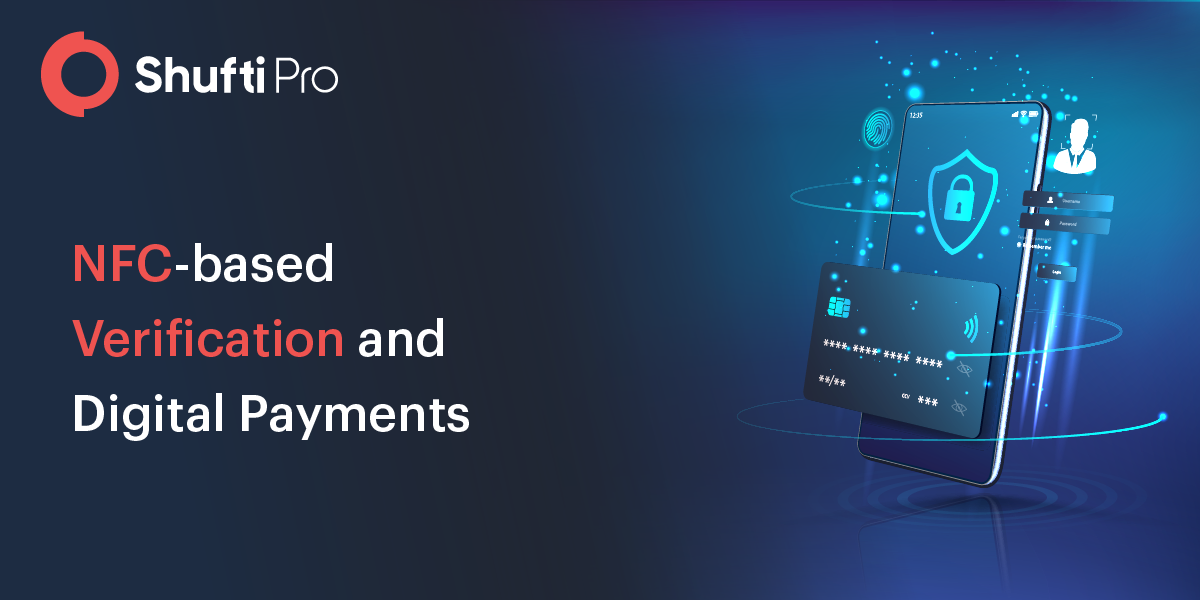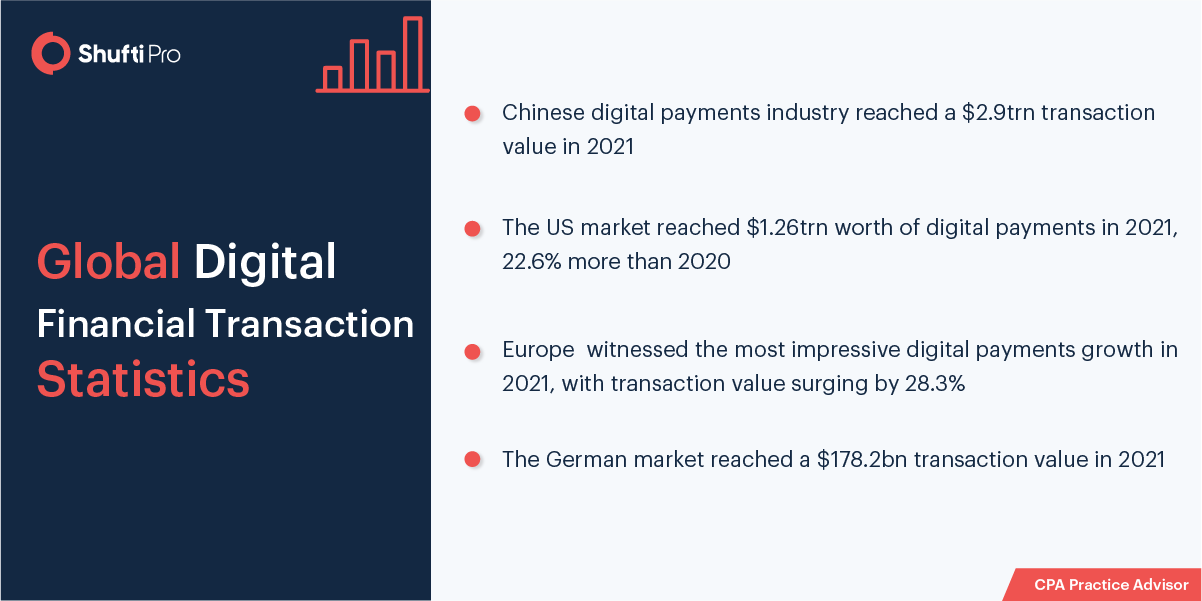NFC Verification – Making Digital Payments Mainstream from Alternative

With time, payment methods have evolved from coins to paper-based money, then plastic, and now smart gadgets. About a decade ago, mobile phones were used only as means of communication. Today, smartphones are utilized to access the internet, online banking, digital transactions, and many other services. Thus, advanced technologies and Near-Field Communication (NFC), are becoming a source to innovative financial industry. It is completely transforming payment gateways and replacing wallets with smart gadgets.
The online financial payment industry experienced significant growth in 2021, with transactions increasing by 22% to over $6.6 trillion. However, it is expected to touch $10.5 trillion in the next four years. The crucial driver behind the growth of digital currency is the rapid adoption of smartphones, which is lowering the barriers for new businesses to embrace NFC payment gateways. However, mobile banking and online transactions are becoming versatile and allowing various services. It is particularly true for P2P money transfer which holds significant value for emerging economies.
NFC and Banking
The emergence of NFC technology has had a positive impact on the banking sector. The transformation of financial services and rapid adoption of mobile payments is the only fruitful result of NFC. With this, the number of paper-based transactions is declining as clients are now using cards or smartphones for payment purposes. Now individuals have to no longer wait in queues or carry large amounts of cash. NFC makes the transaction process seamless, secure, and more convenient. Banking sectors have come up with online services as well as NFC-based credit cards through which people can just tap and pay.
Near-Field Communication (NFC) has created digital payment opportunities and is paving innovation for financial institutions. It is making it easier for people to adopt digital wallets, to carry either virtual assets or conventional money.
Soft Cards
Furthermore, the payment industry and financial firms have developed international mobile wallet standards called soft cards. The smartphone companies including Huawei, Apple, Samsung, and many others have incorporated NFC technology into their devices to support the global digital payment drives. With advancements in NFC products like Apple pay, google wallets and many others become today’s main streams.
Verified Transactions
However, credit to NFC’s contactless payment facility, the banking sector is widely exploring this field to make ease for the customer. NFC not only aids financial institutions to initiate online transactions but also allows them to verify the true identities of their clients before getting them onboard or permits to carry out transactions.
Recently, reports broke out regarding google play to add NFC payment services to its application in India. Due to this the Axis Bank of India introduced tokenized credit card option, aiming to provide customers a secure payment experience. The tokenization process replaces the clients’ sensitive information with the token, completely eliminating the risk of crime.

NFC Standardization
The efforts of standardizing mobile NFC payments have attracted global attention at a large scale. Global standard development authorities like the European Telecommunications Standard Institute (ETSI), the International Organization of Standardization (ISO), and financial firms either private or government are working together to come up with better standards to make the online payment services flawless.
The International Telecommunication Union (ITU) is focusing primarily on making financial services secure and harmonizing frequency ranges used by RFID. However, NFC devices and cards have been standardized, following are some of the standards:
International Organization of Standardization (ISO)
Near-field communication is standardized by ISO. NFC devices use a 13.56 MHZ frequency band for touchless mobile or digital financial transactions. This bandwidth was certified by ISO/IEC as a global standard in 2003. International organization of standardization is also working to make new standard called ISO 12812, particularly for mobile payment services, which aims to fulfill
- Security and clients data protection rights
- Mobile P2P payments
- Online P2B payments
- International requirements for mobile banking applications
Once these sets of standards are adopted by the banking sector, online mobile financial services will allow firms a branchless banking experience.
European Commission Directive on Payment Services (PSD)
The European Commission has developed a directive for payment services to provide EU member states a unified legal payment framework with well-defined regulations and standards, resulting in a Single European Payments Area (SEPA). This includes 32 European countries and also includes nations that are not part of the EU. The SEPA initiative aims to reduce the legal, technical, and market challenges between the nations to develop single retail payment, including the card standardization program for mobile transactions services. Yet, many efforts are made in this regard, the progress has been slow, as countries are opposing regulatory standards imposed on non-financial firms. Following are the payment standards;
- IBAN is must to identify the payment account
- ISO 20022 XML standard must be used for messages
- The remittance data field must only allow 140 character
- Payment schemes must not set a minimum threshold for transaction
Global Digital Financial Transaction Regulations
Electronic Fund Transfer Act (EFTA)
Electronic Fund Transfer Act is imposed on the financial transaction initiated through a computer, smartphone, or magnetic tapes instructing the financial firms to debit or credit a client account. Such include credit/debit card transactions, direct withdrawals or deposits, and ATM transactions. However, this regulation applies to banks and other financial firms, but certain provisions only apply to the individual. EFTA also established clients’ rights to a number of disclosures and error resolution processes for unauthorized or bogus transactions. However, the disclosures include terms and conditions of the EFT services and regarding resolution procedures.
Gramm-Leach-Bliley Act (GLBA) Privacy and Data Security Provisions
The data security standard and privacy law issued under GLBA applies to financial firms as well as non-banking sectors that are engaged in financial operations. The banks are obliged to provide customers with notices associated with the privacy of non-public personal information. The GLBA data security initiative renders guidelines for financial firms to secure clients’ sensitive information.
Federal Deposit Insurance (FDI)
Federal Deposit Insurance and national credit union administration laws apply to deposits and accounts. These include checking, savings share, and share draft accounts at the credit unions. However, if the money is deposited through mobile, it is covered by deposit or share insurance. The owner of the capital will receive a deposit for those funds up to the applicable limit. Yet the share insurance does not guarantee that the clients’ funds will be secured in case of bankruptcy or any glitch in the online mobile payment chain.
How Shufti Can Help
Shufti’s state-of-the-art NFC verification services are an ideal option for the payment industry as well as the digital financial service providers. It allows businesses to verify the real identities of the customers before onboarding as well as authenticating the legitimacy of the transaction before they are carried out. With market-leading accuracy of 98.67%, financial institutions can ensure seamless customer experience and improved security as well.
Want to know more about NFC-based ID verification for financial institutions?

 Explore Now
Explore Now













